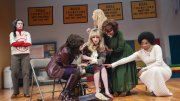For a while, all seemed to go well at the ribbon-cutting ceremonies for the New College Theatre on October 17. As a jazz trio played in the balcony, a full house settled into the comfortable, red-upholstered seats in the steeply raked auditorium. President Drew Faust made a few remarks, noting, for example, that five U.S. presidents and a justice of the Supreme Court had performed in the building in its previous incarnation: “Perhaps they discovered that politics is mostly theater,” she put in, drawing one of the first laughs from the new stage. And then, along with Faculty of Arts and Sciences dean Michael D. Smith and dean of Harvard College David Pilbeam, she approached the wide ribbon that stretched across the proscenium, scissors in hand.
Suddenly a large blonde in a red-sequined dress and red-feather headdress charged down the aisle, yelling, “Wait! Stop! Don’t cut the ribbon!” The obstreperous interloper quickly declared Faust’s scissors utterly inadequate and another, suspiciously tall, woman instantly appeared with a giant three-foot-long pair. The blonde called for better lighting, and the theater’s high-tech system showed off some of its textures and gels. She next critiqued the administrators’ clothes, finding Smith’s so hopelessly bland that she planted her headdress on him. Finally, she called for music, and buglers appeared at the sides of the stage to play a fanfare, after which Faust was finally permitted to carry on.

Photograph by Justin Ide/Harvard News Office
Playwrights on playwriting: (right to left) John Guare, Melinda Lopez, Adam Rapp, Paula Vogel, and Robert Brustein.
The interloper—in drag, of course—was David Andersson ’09, cast vice president of the Hasty Pudding Theatricals, and his spectacular intrusion (Faust had been warned to expect an interruption) added both a theatrical note and a nod to the long history of the newly renovated building. That accomplished, Robert Brustein, founding director and creative consultant of Harvard’s American Repertory Theatre (ART) hailed Faust: “Anyone who has the name of a great English play by Marlowe and a great German play by Goethe surely will look favorably on the theater.” He then moderated the discussion as distinguished playwrights John Guare, Melinda Lopez, Adam Rapp, and Paula Vogel addressed the query, “Does Playwriting Have a Future?”
Guare, author of Six Degrees of Separation and many other stage works, who teaches at Yale, raised a point that the panelists seemed to agree on. “The future of American playwriting takes care of itself,” he said. “But what’s the future of American producing?” Brustein observed that readings, meetings, and workshops were fine, but “What the playwright really needs is help getting his play produced. In America right now we have 35 or 40 major playwrights. We don’t have the audiences, but we do have the plays.” Rapp, author of Nocturne and Animals and Plants, worried that “there’s an atrophy to the audience—the audience for plays is getting older.”
The playwrights pointed to the rise of the multimedia entertainment industry as a major factor affecting live theater. “We are going further and further toward entertainment and toward plays that look more like TV,” Rapp said. “I saw a play with 52 scene changes—and I disconnected 52 times.” Vogel, who won the 1997 Pulitzer Prize for How I Learned to Drive, declared, “It feels very much like the entertainment industry is producing entertainment for a gladiatorial empire.” Lopez, whose Sonia Flew won the Eliot Norton Award for best new play and who teaches theater and performance (she is also an actress) at Wellesley, suggested that commercial entertainment spares audiences the risks and uncertainties of fresh drama: “With [the Broadway show] Little Mermaid, it’s a relief to know what you’re getting when you spend your money.”
In that context, Rapp said, “Maybe the next five or 10 years of exciting things to happen in theater will happen in universities.” Lopez might have voiced the evening’s most reassuring conviction. “You tell stories that you have to tell,” she said. “At our core, we are animals. And we need something from each other that we can’t get from a screen.”








